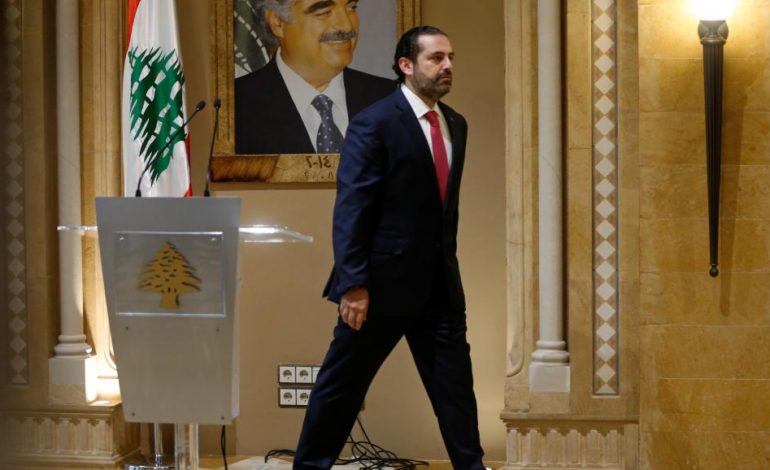BEIRUT — Saad al-Hariri resigned as Lebanon’s prime minister on Tuesday, declaring he had hit a “dead end” in trying to resolve a crisis unleashed by huge protests against the ruling elite and plunging the country deeper into turmoil.
His resignation points to rising political tensions that may complicate the formation of a new government capable of tackling Lebanon’s worst economic crisis since its 1975-90 civil war.
The departure of Hariri, who has been traditionally backed by the West and Sunni Gulf Arab allies, raises the stakes and pushes Lebanon into an unpredictable cycle. Lebanon could end up further under the sway of the Iranian-backed Hezbollah, making it even harder to attract badly-needed foreign investment.
It also defies Hezbollah, which was part of his coalition and wanted him and the government to stay on. Hariri is seen as the focal point for Western and Gulf Arab aid to Lebanon, which is in dire need of financial support promised by these allies.
Lebanon has been paralyzed by the unprecedented wave of protests against the rampant corruption of the political class.
“For 13 days the Lebanese people have waited for a decision for a political solution that stops the deterioration (of the economy),” Hariri said. “And I have tried, during this period, to find a way out, through which to listen to the voice of the people.
“It is time for us to have a big shock to face the crisis,” he said. “To all partners in political life, our responsibility today is how we protect Lebanon and revive its economy.”
Under Lebanon’s constitution, the government will stay on in a caretaker capacity as talks begin on forming a new one. It took nine months to form the Hariri coalition cabinet that took office in January.
The turmoil has worsened Lebanon’s acute economic crisis, with financial strains leading to a scarcity of hard currency and a weakening of the pegged Lebanese pound. Lebanese government bonds tumbled on the turmoil.
Sayyed Hassan Nasrallah, head of the Lebanese Hezbollah, said last week that roads closed by protesters should be reopened and suggested the demonstrators were financed by its foreign enemies and implementing their agenda.
On Tuesday, Secretary of State Mike Pompeo urged Lebanon’s political leaders to help form a new government responsive to the needs of its people after Saad al-Hariri resigned as prime minister following huge protests against the country’s ruling elite.
“The peaceful demonstrations and expressions of national unity over the last 13 days have sent a clear message,” Pompeo said in a statement. “The Lebanese people want an efficient and effective government, economic reform, and an end to endemic corruption.”
France, which has supported Hariri, called on all Lebanese to help guarantee national unity.
“Prime Minister (Saad) Hariri has just resigned, which makes the crisis even more serious,” Jean-Yves Le Drian told parliament in Paris, hours after Hariri announced he was resigning.
Le Drian has urged Lebanese authorities “to do everything they can to guarantee the stability of the institutions and the unity of Lebanon.”
Iran urges unity among Lebanon’s political groups
Iran called for unity among Lebanon’s political groups on Tuesday.
Iranian Foreign Ministry spokesman Abbas Mousavi said in a statement that Tehran “calls for unity among all political groups and parties in Lebanon to maintain security and stability in the country and meet the legitimate demands of the Lebanese people.”
He added that Iran hopes Lebanon would pass through “this dangerous and sensitive phase” successfully.
Lebanese Lira under pressure
Banks were closed for a 10th day, along with schools and businesses.
Hariri sought to defuse popular discontent last week through a batch of reform measures agreed with other groups in his coalition government, including Hezbollah, to — among other things — tackle corruption and long-delayed economic reforms.
But with no immediate steps towards enacting these steps, they did not placate the demonstrators.
Central bank governor Riad Salameh called on Monday for a solution to the crisis in just days to restore confidence and avoid a future economic meltdown.
A black market for U.S. dollars has emerged in the last month or so. Three foreign currency dealers said $1 cost £1,800 on Tuesday, weakening from levels of 1,700 and 1,740 cited on Monday.
The official pegged rate is 1,507.5 pounds to the dollar.






Leave a Reply